|
|
|
Sort Order |
|
|
|
Items / Page
|
|
|
|
|
|
|
| Srl | Item |
| 1 |
ID:
101326
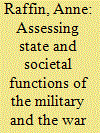

|
|
|
|
|
| Publication |
2011.
|
| Summary/Abstract |
Studies on the military in Vietnam today see a concurrence between the changing role of the army-its growing economic role as well as its role as a tool to control the Vietnamese population-and the changing economy and international environment. How do we make sense of this evolution and its impact on civil-military relations in terms of power relations and authority? This study seeks to provide an analytical framework that shows how the military is not a homogeneous entity but rather is made up of various groups that derive uneven benefits from the post-cold war situation. The author's contribution is primarily at the conceptual level, stressing the dynamics of power relations among the military, society, and state from a Weberian perspective. Doi moi, as an era of economic and social change, has redefined power relations. The author also emphasizes the generational and historical elements in civil-military relations that are specific to Vietnam.
|
|
|
|
|
|
|
|
|
|
|
|
|
|
|
|
| 2 |
ID:
098466
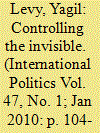

|
|
|
|
|
| Publication |
2010.
|
| Summary/Abstract |
Militaries work intentionally, visibly and in a politically controlled manner to fulfill their formal assignments as the professional perpetrators of external violence on behalf of the state. It is to this level of military action that the existing literature on the civilian control of the military is confined. However, through the intensive interaction between the military and civilians, the effects of formally controlled military activity go beyond the professional domain and are felt in civilian areas, where, in the long term, military activity helps create structures of unequal power relations. Given its structural dimension, this aspect of the military is not necessarily or immediately visible to the main agents involved; hence, it is divorced from effective civilian control. I conceptualize this neglected type of control as effectual control, distinct from the theoretically well-established notion of operational control. This paper theorizes the essence of effectual control.
|
|
|
|
|
|
|
|
|
|
|
|
|
|
|
|
| 3 |
ID:
188584
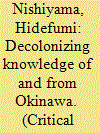

|
|
|
|
|
| Summary/Abstract |
This paper explores the militarized situation of Okinawa Island and the ongoing struggles and challenges that Okinawans continue to confront. Particular focus is placed on how Okinawans challenge dominant colonial forms of knowledge, which assert that the U.S. military presence on the island is beneficial for Okinawan and Japanese people. After contextualizing Okinawa Island within contemporary American imperial geopolitics and outlining the current state of the island, the paper looks at three different, yet closely integrated, ways in which Okinawans, led by activists and progressive local officials, challenge the dominant narrative on the U.S. military. By questioning dominant assumptions about security, a base-dependent economy, and Okinawans’ indigenous status, these movements contribute to the decolonization of knowledge, an important step toward the demilitarization of the island. The paper concludes with a discussion of remaining challenges for decolonial knowledge production.
|
|
|
|
|
|
|
|
|
|
|
|
|
|
|
|
| 4 |
ID:
141784
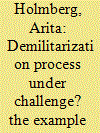

|
|
|
|
|
| Summary/Abstract |
During the past decades, the process of militarization that characterized Sweden after the Second World War has been replaced by a process of demilitarization. With the debates following the war in Georgia 2008 and the Russian annexation of Crimea in 2014, this process of demilitarization appears under challenge. This raises questions about the nature of these processes and the problems facing the attempts at turning them around. The article introduces a framework for analysing the influence of the military upon politics and society in the twenty-first-century European context with the aim of better understanding the various traits, their interconnections and relation to broader trends in Europe and the West. The analysis shows that traits of demilitarization are still dominating in Sweden, although some indications of remilitarization can be found.
|
|
|
|
|
|
|
|
|
|
|
|
|
|
|
|
| 5 |
ID:
122072


|
|
|
| 6 |
ID:
105282
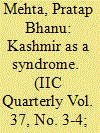

|
|
|
| 7 |
ID:
091930
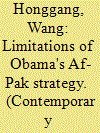

|
|
|
|
|
| Publication |
2009.
|
| Summary/Abstract |
The Af-Pak strategy formulated by the Obama administration is characterized by localization, Integration, demilitarization and polygonization. It is a rational strategy, but it has three defects: the first is that strong pressure imposed on Pakistan may make the country more unstable and increase the unrest in surrounding areas; the second is that demilitarization will be unable to produce results or to meet the political need of the Obama administration; the third is that its geopolitical dimension may weaken other countries' cooperation and support. China generally supports the strategy, but still has many misgivings.
|
|
|
|
|
|
|
|
|
|
|
|
|
|
|
|
| 8 |
ID:
083382
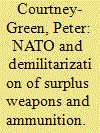

|
|
|
|
|
| Publication |
2008.
|
| Summary/Abstract |
The NATO Partnership for Peace (PfP) Trust Funds originated in September 2000 and now cover destruction of all types of weapons and conventional ammunition. Trust Fund projects originally were developed in countries of the Balkans and the Former Soviet Union, which possessed very large surplus stocks of weapons and munitions, difficult to maintain safely and securely. This article focuses on projects involving demilitarization, especially small arms and ammunition, rather than those involving wider defence reform objectives, such as retraining former military personnel.
There are four fundamental elements of Trust Fund programmes: an appeal for assistance from the host country; fundraising by the lead nation; development and signing of legal and financial agreements; and the execution of the project. The last is normally entrusted to the NATO Maintenance and Supply Agency (NAMSA). Demilitarization of munitions is part of its core business and it has the necessary contracting, project management, and financial management capabilities. There are now 34 eligible countries of the PfP, Mediterranean Dialogue and Istanbul Cooperation Initiatives. Projects have been completed or are planned in Afghanistan, Albania, Azerbaijan, Belarus, Bosnia-Herzegovina, Georgia, Jordan, Kazakhstan, Moldova, Montenegro, Tajikistan, Serbia, and Ukraine. The NATO Trust Fund process has been a successful vehicle for international cooperation. It is likely to continue for several years. There is scope for other international organizations to cooperate with NATO in developing and executing projects of this type.
|
|
|
|
|
|
|
|
|
|
|
|
|
|
|
|
|
|
|
|
|